Hello there. Hope you’re doing ok. Today we’re back with another spoiler-tastic discussion of a modern indie adventure game. At some point we’ll think of a good name for this series and link all the articles together with a tag, but for now we can just point you in the direction of previous chats about Firewatch, The Vanishing of Ethan Carter, Gone Home and Her Story.
Today’s game is Tacoma, the second release from Gone Home developers The Fullbright Company. Set onboard the space station of the same name, you are Amy Ferrier, a contractor sent to the abandoned station to retrieve its AI module and any remaining data. Through use of an augmented reality (AR) system, you are able to access scenes and conversations featuring the now-departed crew (station administrator E.V. St James, operations manager Clive Siddiqi, botanist Andrew Dagyab, tech specialist Natali Kuroshenko, engineer Roberta Williams, doctor Sareh Hasmadi) and ODIN, the station AI.
Spoiler for the word spoiler ahead: a spoiler is something that reveals plot and story information in a manner that may *spoil* others’ enjoyment of it. And if you were happy to read that spoiler about the word spoiler, you’ll now know that if you haven’t played the game already then the discussion ahead may not be appropriate for you, unless you aren’t bothered about such things, or have no intention of playing the game.
That would be a shame, though, as we’d highly recommend Tacoma. Here’s a short trailer:
If it looks like your cup of tea, then by all means go ahead and give it a go: you’ll be welcome back here when you’re done.
Otherwise, here’s your ***final spoiler warning*** for the discussion ahead!
Overthinking it
Rik: We normally discuss why we chose a game, but I think in this case it was after a lot of procrastinating.
Jo: I think after Firewatch maybe we just weren’t really sure which direction to go in next.
Rik: Yes. We did lists and spreadsheets, but then eventually I was just like, ‘Tacoma?’
Jo: Well, I think we were maybe hitting the point of ‘overthinking it’…
Rik: It certainly makes sense. We’ve done a lot of so–called ‘walking sims’ so far.
Jo: Yeah, I’m sort of reluctant to call them that.
Rik: And this one is from the makers of Gone Home…
Jo: The Fullbright Company…
Rik: And we both had a copy of it. Did you know much beforehand?
Jo: I’ve had it for a while. I mainly bought it cos it was by the Gone Home people, and I’d watched the trailer, but that doesn’t give too much away.
Rik: Me too, I got excited after Gone Home and bought this in a sale, then left it in the pile of shame without doing much further research.
Jo: I don’t know why, but because it was set in space, I was half anticipating it being…I don’t know…I was expecting maybe some fighting elements? I don’t know why. Just maybe connection with other games set in space.
Rik: I suppose before these kinds of games came along, first–person games tended to have some compulsory fighting in them.
Jo: I just never seemed to be ‘in the mood’ for it.
Rik: Did you expect Gone Home 2, or was it the fact that Tacoma looked to be at least slightly different that stopped you jumping straight in?
Jo: I think part of me wanted it to be Gone Home 2 even though I knew that it definitely wasn’t going to be. Perhaps that’s why I hung back a bit. Did you have any expectations at all?
Rik: No. I knew there wouldn’t be combat. And I knew there was a time-lapse reconstruction mechanic of some sort.
Jo: I suppose, just to explain a bit further, I did have at the back of mind, the knowledge that some of the folk from Fullbright worked on Bioshock and perhaps that’s where the connection came from.
Rik: I must have read a review, probably when I found out that it existed, which mentioned the main mechanic. (And strongly implied no combat).
Jo: I think I was a bit worried that I had jumped to the conclusion that it would be another game in the style of Gone Home, but then part of me was thinking ‘but might it actually be like Bioshock ?’
Rik: Did you think there would be DANGEROUS THINGS on the space station?
Jo: Yes. Just because it was set in space.
Rik: We’ve all seen the movies. Part of me thought, we really have seen the ‘go to this abandoned space station where something has gone wrong’ thing before. So I did hope it would do something something a bit more interesting with the setup.
Jo: I definitely had a sense of dread at the beginning and again at the end. But weirdly, I felt it more with Gone Home.
Rik: I think you’re right about the sense of dread. But it sort of hints at, then deftly avoids, the full set of clichés. Like the ‘something went wrong
here’ stuff…
Jo: Yes…
Rik: And that first party scene makes you think it’s something it isn’t, celebrating ‘Obsolescence Day’ – I thought at first, are they all getting fired, or do they know they are being left here to die and are having a party? And it’s sort of both and sort of neither – the party isn’t about that.
Jo: I got the impression that ‘something bad’ was going to happen, I just wasn’t sure what it was.
What are you doing, Dave?
Rik: How did you find the AR mechanics?
Jo: They took some getting used to, but not as much as the initial zero gravity bit at the beginning, which was horrendous. I couldn’t steer towards the door…
Rik: Oh yeah. I did think, I hope it isn’t all in zero gravity. But most of it isn’t, just the main hub.
Jo: How did you find the AR bit?
Rik: I thought, is this going to be complicated, especially as it combined the rewinding and rewatching events with accessing people’s computers.
Jo: There was a lot going on.
Rik: I thought it was quite clever the way you would need to go to different rooms and watch different people, follow them, and see them alone as well as in different groups.
Jo: Yeah, I liked that you got to hear different snippets of conversations happening at the same time.
Rik: But then the thing about accessing their files, I didn’t quite understand at first.
Jo: No, it took me a while to figure out what I was supposed to be doing with those little bubbles that kept appearing on the playback timeline.
Rik: Compared with Gone Home, which I guess we need to stop doing constantly, it seemed more complicated. But it isn’t really. It’s still relatively simple by the standards of an adventure.
Jo: Also, I struggled to hear what some of the characters were saying when other characters nearby were also talking.
Rik: I always put subtitles on in games.
Jo: This is problem I have in actual life, too. There might be something wrong with my hearing…
Rik: After the first scene, you pretty much get it, I think.
Jo: It just added an extra layer of interaction, beyond examining different objects.
Rik: Gone Home was very clearly about exploration, and finding things gave you more story.
Jo: Yes, and there’s an element of that in Tacoma, but there’s more going on.
Rik: You’re almost not quite sure what the mechanism for driving things forward is: most of it is about the AR system, then there are the various computer systems you can access, then third (and possibly the least important/most neglected) is the physical objects you find lying around. In Gone Home you would be excited about every new room you found…
Jo: Yeah, and as we said in our discussion, a good balance of relevant objects and just another cup.
Rik: Here there are quite a lot of dull rooms, in which you find out a few tidbits about individuals, and the world they’re living in, but never much more than that. Lots of food packets here!
Jo: Many lip balms and medications…
Rik: On the other hand, the e–mails and other electronic info fill in a lot of the blanks.
Jo: I think, as you said, the objects were less crucial this time around, because of the AR playback of scenes.
Rik: But you didn’t have that same excitement about finding a crew’s quarters and going through their stuff.
Jo: No, I agree.
Rik: But I suppose that was my only real negative, and you got a sense of who people were from other sources.
Jo: I felt like those aspects just filled in a bit of detail about the character but not really the story.
Rik: Gone Home of course didn’t have any characters actually present, whereas here you see a version of them.
Jo: But you felt like you had a good sense of who those characters were by the objects that you found.
Rik: Yep, here you literally see clips of who they are, with others, and in private.
Jo: Yeah.
Rik: I found the AR stuff quite clever, in that actually showing characters would have broken something exciting about these games. But you still see their shadows, and hear their voices. And there’s a variety of body shapes, nationalities and sexualities among the crew.
Jo: Yes, and that’s a refreshing change, actually.
Rik: So that first party isn’t that ominous, but then something bad does happen. And immediately, your mind goes to ‘stranded on space station by evil corporation’ storylines. Or ‘do they all go mad and kill each other’…
Jo: Well…I sort of went a bit down the whodunnit route.
Rik: You thought there was a Paul Reiser Burke type character?
Jo: Yes!
Rik: Guys, maybe ‘The Company’ isn’t actually all that bad?
Jo: I don’t know what gave me that impression.
Rik: There is that Clive character who is very career-focused, or the botanist [Andrew] who feels sure everything will be fine.
Jo: I guess there was a lot of discussion about their contracts being renewed for another year, and some of them have incentives to stay/not stay.
Rik: Or will it be the creepy AI?
Jo: I feel like it’s inherent in me not to trust AI (probably from watching sci-fi films). I don’t even trust Siri.
Rik: What are you doing, Dave? (etc.) I thought the world they built around contracting was quite interesting, like the current gig economy.
Jo: Yeah, me too.
Rik: No–one works for anyone.
Jo: And once you’re out, you’re out.
Rik: Unless you joined them and committed to a company out of school or something. I felt that aspect most through Clive’s backstory…
Jo: Yeah, isn’t he trying to get back onto a hotel/cruise–liner spaceship situation?
Rik: I think so – join a rival company. But he clearly believes in the corporate structure, which made me not trust him. Or indeed his relationship with the station administrator, E.V., who technically has the most power, but is a bit lonely and vulnerable.
Jo: I didn’t trust Natali.
Rik: Oh really?
Jo: I was like ‘why does she want the systems access so badly?!’ Plus she didn’t want to be there, and [girlfriend] Bert feels guilty about her being assigned to Tacoma because she knows she could be doing something better.
Rik: It’s quite good how it starts you off guessing in this way. It sort of plays with the various clichés and expectations, and you do find more out about all the characters and their motivations. But none of them has done anything untoward.
Jo: Yeah exactly. I think I was a bit cold towards everybody at first (again, much like in real life) but then as you dig deeper, more comes to light about each of them.
Space Bungalows
Rik: So this is all taking place under the pretext that you, a contractor, are going to collect data from the space station. Different bits of which open up as you progress.
Jo: Yes – collect whatever data was left and get out.
Rik: And don’t look at it, contractor…
Jo: No, don’t interact with anything.
Rik: Presumably just stand there while your tablet is attached to the wall and watch the progress bar fill up.
Jo: I did wonder several times… am I the bad guy? Or do I work for the bad guys?
Rik: You’re just a contractor. And you don’t do what they say anyway. I did find it a curious thing that it’s sort of about big corporations, and data, and knowing everything, but then you have to go and physically plug in a bit of machinery on the station itself to collect this info. Plus they don’t seem to know that you’re mucking around in there.
Jo: There’s a point part–way through the game which did get me wondering, where someone sends you a message and then they’re like ‘your real handler is coming back now’ – that did make me start to wonder what was going on there.
Rik: You thought that they were deleting stuff, and also perhaps assisting you?
Jo: It definitely cast doubt in my mind about what was going on.
Rik: Again, I thought, oh no, is there going to be some kind of rebellion storyline. But they keep all that under wraps well.
Jo: Yeah, really well.
Rik: I figured Amy was just a drone doing a job. As did ‘The Company’ [Venturis Technologies], I guess!
Jo: As much as you start uncovering about the characters, you also start uncovering the recent history of the company.
Rik: You find out about Obsolescence Day, and what it really is: removing humans from the workforce.
Jo: There’s this whole thing with the space bungalows.
Rik: Sorry, did you say ‘space bungalows’?
Jo: Yeah, the space bungalows: they’re trying to pull back from recent mishaps… or something? I can’t remember. But the botanist guy has invested. They’re like holiday homes, in space. I thought there was a recent incident, and then that was having an impact on their latest venture, which was the space bungalows. I realise I just sound worse each time I say ‘space bungalows’ – but I can’t remember and I haven’t written sufficient notes.
Rik: [*Googling*] Ah, the Venturis Belt – automated living spaces. But the Human Oversight Accord means it can’t go ahead. Hence Venturis needed to make it look like humans risked too much in space, and could make mistakes.
Jo: Yes! Hence the drive to remove them from the workforce.
Rik: Handled wrong it could have looked like very heavy–handed satire, but it’s done well. It’s plausible, but not too on the nose. I did have a chuckle at the AI therapist…too many people going mad for actual therapy to be viable, so it’s automated.
Jo: Where was the AI therapist? I feel like I missed that… although my memory isn’t proving to be up to much today.
Rik: It was on one of the character’s computers I think.
Jo: Oh yeah, I remember now.
Rik: There’s like a transcript, of lots of feelings, and the AI is just going, mm–hmm, yes…
Jo: hahaha – ‘and that’s the end of our session’
Rik: ‘I hope I helped you today’
Jo: I feel like I derailed us, where were we?
Rik: I think we were just talking about some of the corporate stuff. There’s also that whole thing about money vs company loyalty points, a sort of hyper-capitalism that isn’t so far from what we have now that it seems unreal. And everyone sort of goes along with it.
Jo: It gave me the impression that it was almost pension-like, in that your loyalty is rewarded.
Rik: But you must never ever move jobs, otherwise it’s the end.
Jo: And you can’t go back.
Rik: A weird twisting of the argument that capitalism encourages competition: you can always go and work for a rival, except as the companies get bigger and fewer in number, the choices get smaller and the consequences greater. Not to suggest that it’s a really political game, but I thought this bit was all cleverly done.
Jo: What did you think about the storyline with Sareh?
Rik: I guess Sareh is the hero, in that she is the last one left and makes the decisions, although it’s really an ensemble piece.
Jo: Yeah, but I mean before getting to the ending, we find out that one of her patients died on a previous station. It was the AI’s fault, but she got the blame anyway, and she’s understandably deeply affected by it. There’s a little newspaper clipping you find in the storage cupboard somewhere that discusses it.
Rik: I felt we got snippets about all the characters, enough to know who they were, but there was no heroic/redemption narrative for any of them, because in the end they all survive. So I kind of felt that it was all background. Again, setting you up, like, was one or both of Bert and Nat going to die, trying to save everyone? At one point I thought ODIN would kill Sareh.
Jo: They have quite a close relationship.
Rik: ‘What are these things called feelings, Sareh? I think I love you and don’t want you to leave…’
Jo: I just thought, as we were talking about the evil corporation, that bit goes into how one of the crew have been directly affected, because their whole thing is that humans are unreliable.
Rik: Sorry, now I understand. It’s the main story in microcosm: humans make mistakes, therefore we should get rid of them, but actually it’s the AI who can’t be trusted. For the old one in Sareh’s past, it’s the old ‘HAL goes mad’ thing that we’ve seen before. But for ODIN, it’s actually becoming clever enough to realise that something is wrong.
Jo: They definitely play with that, I think. I went in feeling like the AI has gone mad/is about to go mad.
Rik: Instead, he helps.
Jo: He’s advanced beyond his parameters but in a different way, so not just like he’s gone power crazy, but is able to care about the crew, particularly Sareh.
Rik: Just as you think you’re getting into the endgame you can see the work that Natali did with ODIN to develop him in that way.
Jo: Exactly, and you see why she’s trying to get more systems access. And then there’s that string of messages between Sareh and Nat about the AI that messed up.
Rik: In a way it’s a more optimistic perspective about the future. If we made an AI that really was very clever, then it could have empathy and understanding, and not just try to blow up the world.
Jo: Yeah, and in this case, confront the power–hungry humans.
Rik: A nice reversal of the trope of the evil android that works for ‘The Company’.
Cryo–crisis
Rik: I feel like perhaps we haven’t talked about the characters much. But it is, like I said, an ensemble piece.
Jo: They each play a part in dealing with the situation. I did write down ROBERTA WILLIAMS!!!! Do you think that name was picked intentionally?
Rik: Yes, I thought so. [The deliberate homage to the King’s Quest developer was confirmed in this article].
Jo: It can’t not be. Sareh stuck with me the most, though.
Rik: Well, she uncovers the BIG SECRET.
Jo: I know we’ve said she’s the hero, but I felt, I don’t know, ‘closest’ to her somehow in the game. And I wonder if part of that is that she seems to have the most interaction with each of the other characters.
Rik: The others aren’t killed off exactly, as they would be in a space horror, but they’re removed from the story by being sent into cryo sleep. Clive and E.V. first, then Botany guy? Who I thought might betray everyone to the company…
Jo: Well, Andrew has a bit of a cryo crisis doesn’t he? And Sareh is faced with the near impossible task of talking him round.
Rik: Then the two engineers in a couple.
Jo: I did think everyone had been killed off, until the very, very end.
Rik: I thought they would find out the truth, when it was too late, but maybe get a message to the world! Or maybe that’s what Amy would do.
Jo: Towards the end, as I was heading into the room sealed off from contractors, I had that sense of dread again like I did at the beginning. But then there was a triple whammy of things I didn’t expect from the ending.
Rik: Yes!
Jo: I didn’t expect a pre–meditated ploy by the company to destroy Tacoma or that ODIN would be the one to point this out to the crew; I definitely didn’t expect all/any of the crew to have survived; and I didn’t expect that Amy was a rebel.
Rik: I did expect the first one, but not the second, and definitely not the third. At the end when there’s that final twist, you’re like, ‘Holy Fuck!’ And then you blast off into space.
Jo: I knew the company had screwed up, I maybe didn’t connect the dots that it was all part of the plan. That the whole point of them even really being on Tacoma was for them to die out there, essentially.
Rik: Ah, so you thought there was just negligence that they wanted to cover up…
Jo: Yeah, I did, like with the AI who killed Sareh’s patient.
Rik: Either way you know the company isn’t sending anyone, and they’re definitely on their own. But it’s quite an unexpectedly upbeat ending.
Jo: I know! It was exhilarating!
Rik: I thought there was a good mix of light and dark. It’s a bleak world, but there’s an optimism there.
Jo: Yeah, I agree.
Rik: I was glad no–one went mad, and there was no traitor, and people weren’t killed off one by one.
Jo: Me too, even though it hints at all of those things. I wonder if having those expectations made me feel so suspicious in the first place, hence going down the ‘whodunnit’ path.
Rik: I think it is aware of, and plays with, those expectations. Even the rebellion thing is another worn out trope, if – for example – the handler had started helping you openly, it would have been a bit naff.
Jo: Yeah, that would have been disappointing.
Rik: As it is, the ending gives you something good, then something brilliant.
Jo: You know next to nothing about Amy really. A bit like Katie in Gone Home, your focus is on uncovering what has taken place in your surroundings.
Rik: Well I think that’s why it’s extra surprising that she has a part to play.
Jo: Except, you do find some stuff out about Katie – not as much compared as the rest of the family, but she is a part of that family. Amy is completely external to the situation, so, you just don’t know what role she has other than to collect the data/have a poke around. She doesn’t respond to the messages she receives.
Rik: The ending was just an example of every time I thought I was going to be disappointed with Tacoma, it shifted things a little and surprised me. So what did you think overall?
Jo: I liked it. I especially liked the ending and that it kept me guessing. How about you?
Rik: Me too. I was pleasantly surprised, it’d taken so long to choose a game, and I wasn’t sure I was in the mood, but then I wolfed it down in a couple of days. I enjoyed it while it was happening and was sad when it was over, you can’t ask for much more than that.
Jo: I was excited, but also worried about it being disappointing.
Rik: Were you disappointed? I can see why it had a reception that was relatively low–key compared to Gone Home.
Jo: I was excited to play it, but felt like my excitement would almost inevitably lead me to being disappointed. It’s a whole psychological thing, but no I wasn’t disappointed. I enjoyed it but in a different way to Gone Home.
Rik: Me too. Was there anything else you wanted to mention?
Jo: I don’t think so.
Rik: A solid recommendation?
Jo: Yes, I would recommend Tacoma.
Rik: Cool. It was fun to do this, as always. But now we’re back to the dilemma of what to do next!
Tacoma is available on Steam and GOG for around £15.

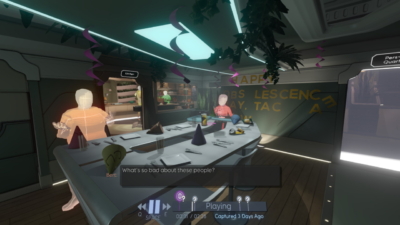
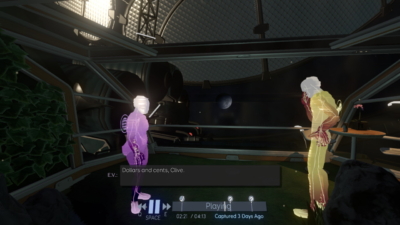
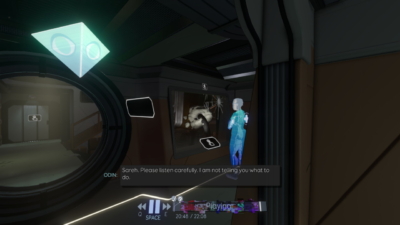
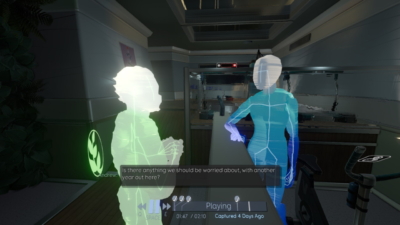

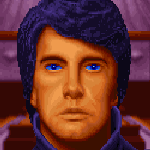
 Posts
Posts